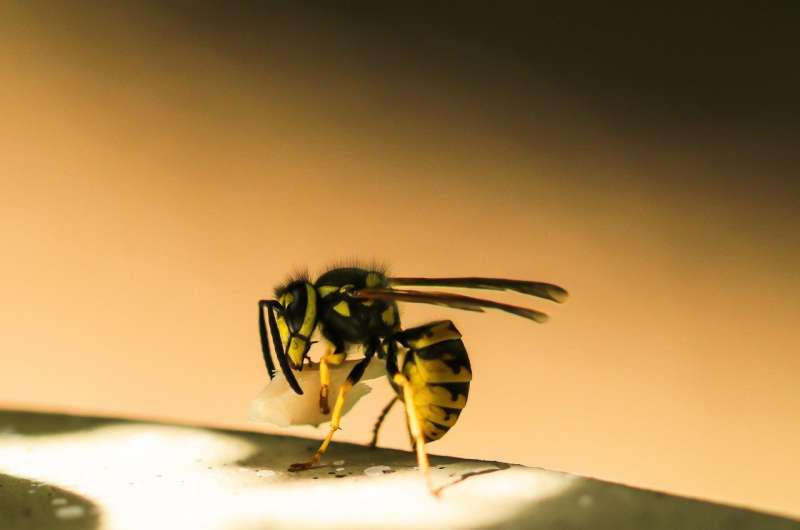Why do we love bees but hate wasps?

A lack of understanding of the important role of wasps in the ecosystem and economy is a fundamental reason why they are universally despised whereas bees are much loved, according to UCL-led research.
Both bees and wasps are two of humanity's most ecologically and economically important organisms. They both pollinate our flowers and crops, but wasps also regulate populations of crop pests and insects that carry human diseases.
"It's clear we have a very different emotional connection to wasps than to bees—we have lived in harmony with bees for a very long time, domesticating some species, but human-wasp interactions are often unpleasant as they ruin picnics and nest in our homes," explained study author, Dr. Seirian Sumner (UCL Genetics, Evolution & Environment).
"Despite this, we need to actively overhaul the negative image of wasps to protect the ecological benefits they bring to our planet. They are facing a similar decline to bees and that is something the world can't afford."
For the study, published today in Ecological Entomology and funded by the Natural Environment Research Council and the European Commission through the Marie Curie fellowship, 748 members of the public from 46 countries were surveyed (70% of respondents were from the UK) on their perceptions of insects, including bees and wasps.
Responses revealed that wasps are indeed universally disliked by the public and this is most likely due to a low-level interest in nature and a lack of knowledge about the benefits wasps bring to our planet's health and function.
How much research is being done to better understand these misunderstood creatures was also investigated. The team found that wasps are an unpopular choice of insect for researchers to study which likely compounds their negative image as little effort is being made to comprehend and communicate their positive role in the ecosystem.
The scientists discovered this by quantifying the number of scientific research papers and conference presentations for bees and wasps over the last 37 years and 16 years respectively.
Of 908 papers sampled, only 2.4% (22 papers) wasp publications were found since 1980, compared to 97.6% (886 papers) bee publications.
Of 2,543 conference abstracts on bees or wasps from the last twenty years, 81.3% were on bees.
Our dislike of wasps is largely shaped by a small number of species of social wasps—the yellowjackets and hornets—which represent less than 1% of stinging wasps but are most likely to come into contact with humans. There are 67 species of social wasps, but the vast majority of wasps—in excess of 75,000 species—are solitary.
The bothersome nature of social wasps fuels the perception that wasps are more dangerous than bees, although each elicit a similarly painful sting.
Survey respondents were asked to provide three words to describe bees, butterflies, wasps and flies, and to rank how seeing each insect made them feel regardless of their importance in ecosystems and the environment.
Analysis showed that butterflies receive the highest level of positive emotion, followed closely by bees, and then flies and wasps. Overall, bees are more liked than butterflies. The researchers also found that personal interest in nature explained whether people understood the importance of wasps as natural pest controllers and predators.
All insects are under threat from climate change and habitat loss, so the team say that maintaining insect abundance and diversity should be a priority.
"Global concern about the decline of pollinators has resulted in a phenomenal level of public interest in, and support of, bees. It would be fantastic if this could be mirrored for wasps but it would need a complete cultural shift in attitudes towards wasps," added co-author, Dr. Alessandro Cini (UCL and the University of Florence).
"The first step on the way to this would be for scientists to appreciate wasps more and provide the required research on their economic and societal value, which will then help the public understand the importance of wasps."
More information: Ecological Entomology (2018). DOI: 10.1111/een.12676
Journal information: Ecological Entomology
Provided by University College London



















